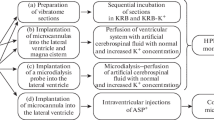Summary
Following the research of Giessen Neurosurgery on primary and secondary lesions of the hypothalamo-pituitary system and the brainstem over a period of more than 30 years, cerebral failure and death does not represent a uniform syndrome but consists of several, well characterized syndromes of irreversible hypothalamo-pituitary, mesencephalic and bulbar failure. The specific syndromes are described in detail. The diagnosis is based on establishing complete irreversible damage of specific vital basal functions such as hypothalamo-pituitary transmission, water-and electrolyte metabolism, temperature regulation, circulation and respiration. The common feature of all types is the irreversible break-down of the complex central neurogenous and/or neurohumoral regulatory system. The permanent and irreversible loss of central regulation and modulation means at the same time the complete cessation of the specific human cortical function, the death of the whole brain. Only in bulbar failure with primary irreversible cessation of respiration artificial respiration can maintain the autonomous functions of the heart for a limited time. It is indicated when organ explantation is to be considered. Complete and irreversible isolated loss of cortical function abolishes the normal human life, but does not mean death of the remaining vegetating human being.
Similar content being viewed by others
References
Böckle, F., Ethische Probleme des Hirntodes. Verhandlungen Dtsch. Ges. Neurologie, Bd. 3, pp. 565–569. Berlin-Heidelberg-New York-Tokyo: Springer. 1985.
Frowein, R., Richard, K. E., Hamel, E., Probleme des Hirntodes. Verhandlungen Dtsch. Ges. Neurologie, Bd. 3, pp. 543–553. Berlin-Heidelberg-New York-Tokyo: Springer. 1985.
Isler, W., Pädiatrische Probleme des Hirntodes. Verhandlungen Dtsch. Ges. Neurologie, Bd. 3, pp. 554–558. Berlin-Heidelberg-New York-Tokyo: Springer. 1985.
Jøergensen, E. O., Spinal man after brain death. Acta Neurochir. (Wien)28 (1973), 259–273.
Kriterien des Hirntodes. Stellungnahme des Wissenschaftlichen Beirates der Bundesärztekammer. Dtsch. Ärztebl.79 (1982), 45–55.
Krösl, W., Scherzer, E. (eds.): Die Bestimmung des Todeszeitpunktes. Wien: Maudrich. 1973.
Laufs, A.: Juristische Probleme des Hirntodes. Verhandlungen Dtsch. Ges. Neurologie, Bd. 3, pp. 559–564. Berlin-Heidelberg-New York-Tokyo: Springer. 1985.
Mollaret, P., Goulon, M., Le coma dépassé. Rev. Neurol. (Paris)101 (1959), 3–15.
Pallis, C., ABC of brain stem death. Articles published in Brit. Medical Journal, Br. Med. J. 1983.
Pia, H. W., Primary and secondary hypothalamus and brain stem lesions. Advances in Neurosurgery 13, pp. 217–253. Berlin-Heidelberg-New York: Springer. 1985.
Pichlmayr, R., Organtransplantation. Verhandlungen Dtsch. Ges. Neurologie, Bd. 3, pp. 570–576. Berlin-Heidelberg-New York-Tokyo: Springer. 1985.
Walker, A. E., Cerebral death, 2nd Edition. Baltimore-Munich: Urban und Schwarzenberg. 1981.
Walker, A. E., Absence of brain function. The sign of death. Verhandlungen Dtsch. Ges. Neurologie, Bd. 3, pp. 535–542. Berlin-Heidelberg-New York-Tokyo: Springer. 1985.
Author information
Authors and Affiliations
Additional information
Dedicated to Prof. Dr. Jean Brihaye at the occasion of his 65th anniversary.
Rights and permissions
About this article
Cite this article
Pia, H.W. Brain death. Acta neurochir 82, 1–6 (1986). https://doi.org/10.1007/BF01456312
Issue Date:
DOI: https://doi.org/10.1007/BF01456312




